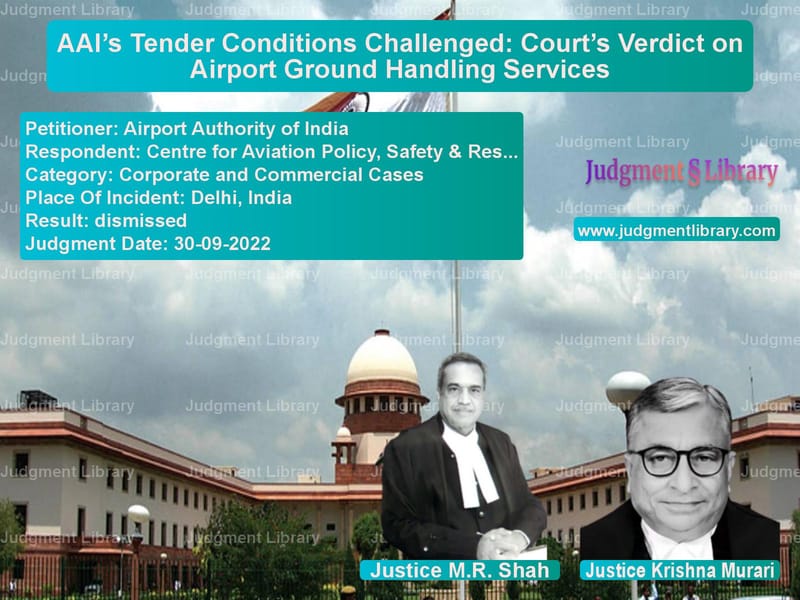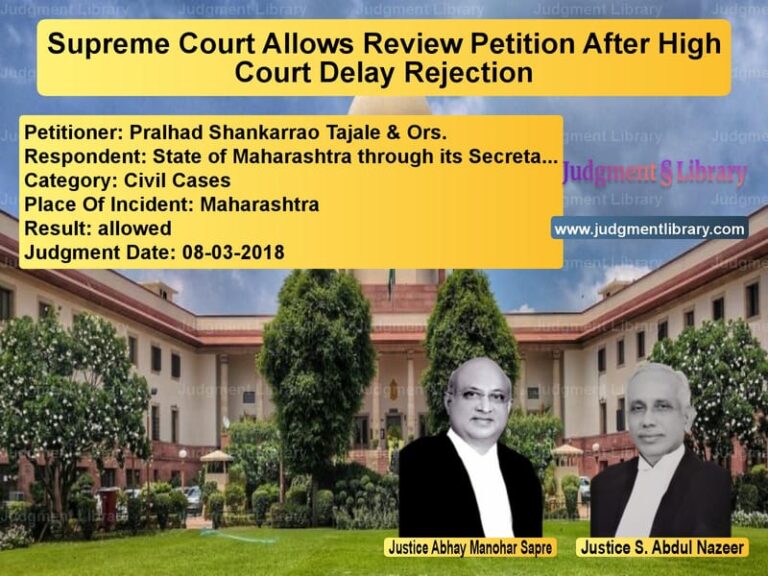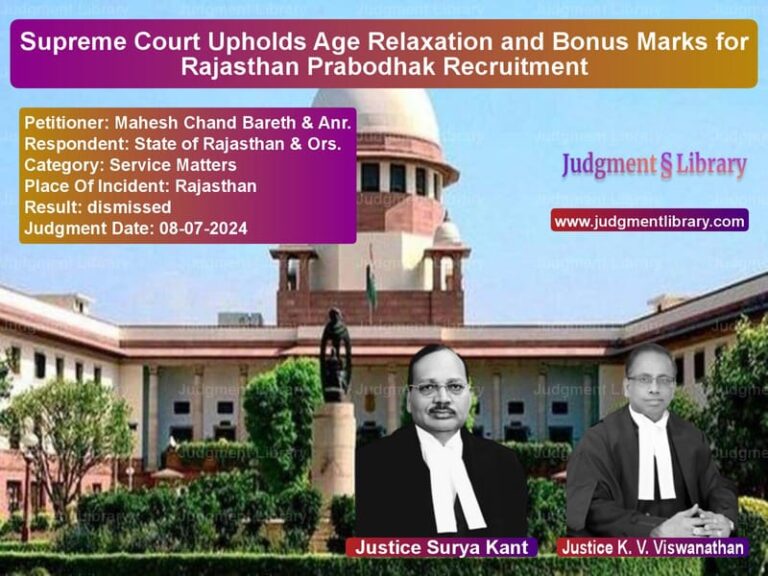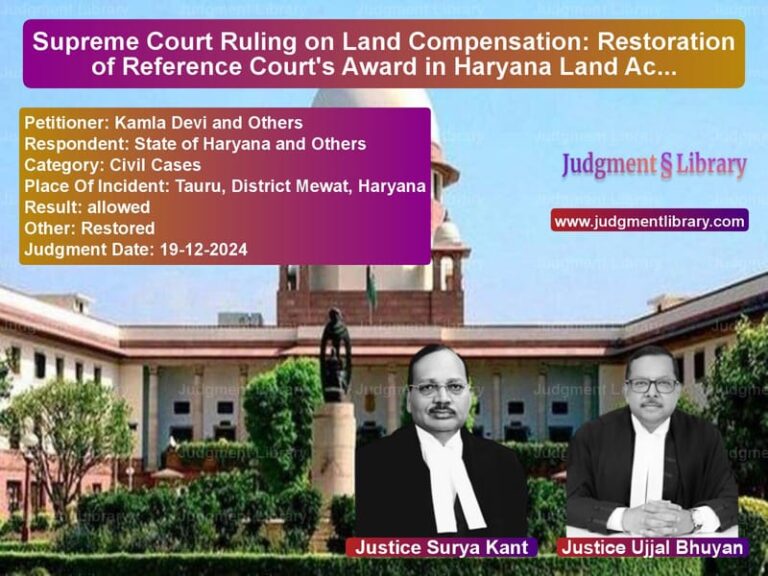AAI’s Tender Conditions Challenged: Court’s Verdict on Airport Ground Handling Services
The case before the Supreme Court involves the appeal of the Airport Authority of India (AAI) against the decision made by the High Court of Delhi in favor of the Centre for Aviation Policy, Safety & Research (CAPSR). The controversy centers around the eligibility criteria and conditions set out in the Request for Proposal (RFP) for the concession of ground handling services (GHS) at Group C, D1, and D2 airports, which were owned and operated by AAI. The issue arose after CAPSR, a non-profit organization advocating for aviation policy, filed a writ petition challenging the terms of the tender process on the grounds that they were discriminatory and exclusionary.
Background of the Case
The AAI had issued a tender in May 2018 for the provision of ground handling services at Group A, B, and C airports, followed by another tender for Group D airports in July 2020. These tenders were modified multiple times, with the final version published as Corrigendum No. 21. However, the AAI canceled the earlier tender for Group D airports on 10th June 2019 and published a new RFP for Group D1 airports. CAPSR, representing small and medium-sized ground handling agencies (GHAs), filed a writ petition, arguing that the revised eligibility criteria and other conditions in the tender process were arbitrary and discriminated against small players in the industry.
The main issues highlighted in the petition included the clustering of 49 airports into region-wise sub-categories, the stipulation that only previous work experience in providing GHS to scheduled aircraft should be considered, and the annual turnover requirement of Rs. 30 crores (later reduced to Rs. 18 crores). CAPSR contended that these conditions would exclude many existing small-scale GHAs that had been operating at smaller airports for years and were already providing GHS to non-scheduled aircraft.
The High Court Ruling
The High Court, after hearing arguments from both the AAI and CAPSR, ruled in favor of CAPSR, striking down the decision to sub-categorize the airports and the requirement that only work experience with scheduled aircraft should be accepted. The Court also found the revised minimum annual turnover criteria of Rs. 18 crores to be discriminatory and arbitrary. The High Court’s decision was based on the premise that the eligibility conditions excluded existing service providers, particularly small-scale GHAs, from participating in the tender process.
The AAI’s Appeal
In response to the High Court’s decision, the AAI filed appeals in the Supreme Court, challenging the judgment on several grounds. The AAI’s counsel, represented by Additional Solicitor General K.M. Nataraj, argued that CAPSR lacked locus standi to file the writ petition. The AAI contended that an NGO had no business challenging the tender conditions, which were within the realm of contract law. Furthermore, the AAI defended the eligibility criteria, arguing that the stipulations were necessary to ensure that only qualified and experienced GHAs could handle the ground operations at such critical airports.
The AAI also argued that the regional sub-categorization of airports and the financial eligibility criteria were designed to promote regional connectivity and ensure that GHAs had the financial capacity and experience to handle the large-scale operations at these airports. The AAI further asserted that the tender conditions were not arbitrary, discriminatory, or mala fide, as the High Court had ruled.
Respondent’s Argument
On the other hand, CAPSR’s counsel, Mr. Umakant Mishra, argued that the terms and conditions in the tender process were indeed discriminatory and arbitrary. CAPSR submitted that the regional sub-categorization was unjustified, as it did not take into account the different sizes and financial capabilities of airports and their respective operators. The respondent also emphasized that the stipulation regarding previous work experience with scheduled aircraft was overly restrictive, as GHAs providing services to non-scheduled aircraft had the necessary expertise and infrastructure. CAPSR also argued that the AAI’s actions violated the provisions of the MSME (Micro, Small, and Medium Enterprises) Orders of 2012 and 2018, which mandated that a certain percentage of procurement be made from MSMEs.
The Supreme Court’s Ruling
Upon hearing the arguments from both sides, the Supreme Court delivered its judgment, holding that the High Court had erred in interfering with the AAI’s policy decision. The Court emphasized that the terms and conditions of the invitation to tender (ITT) were within the discretion of the AAI, which had formulated them based on commercial considerations. The Court referred to established case law, including *Maa Binda Express Carrier v. North-East Frontier Railway* (2014) and *Michigan Rubber (India) Ltd. v. State of Karnataka* (2012), which affirmed that the terms of a tender were not open to judicial scrutiny unless they were arbitrary, discriminatory, or motivated by mala fide intent.
Read also: https://judgmentlibrary.com/corporate-insolvency-resolution-process-a-case-of-co-borrower-liability/
The Court noted that the AAI had provided adequate justifications for the eligibility criteria, including the regional sub-categorization and the financial turnover requirement. The Court also upheld the AAI’s stance that experience with scheduled aircraft was a reasonable criterion, given the larger scale and complexity of operations involving scheduled airlines. As for the MSME Orders, the Court found that the AAI’s tender process did not violate these regulations, as the tender process was not primarily for the procurement of goods and services but for granting licenses for providing GHS at airports.
The Court further held that the High Court had incorrectly entertained the writ petition from CAPSR, as it was not an affected party in the tender process. The Court emphasized that CAPSR, being an NGO, lacked the locus standi to challenge the terms of the tender. It concluded that the tender conditions were not unreasonable or discriminatory and should be allowed to proceed.
Key Legal Principles
The Supreme Court’s ruling reinforces the principle that terms and conditions for tenders issued by government authorities are primarily within the domain of the authority’s discretion. Judicial interference is limited to cases where the conditions are arbitrary, discriminatory, or unconstitutional. The judgment also underscores the importance of ensuring that only qualified and experienced entities participate in critical commercial operations, such as ground handling at airports.
Conclusion
The judgment in this case clarifies the scope of judicial review over tender conditions and emphasizes the importance of fair play and transparency in tender processes. The Supreme Court’s decision allows the AAI to proceed with its tender process for ground handling services, ensuring that qualified and capable service providers are selected to handle operations at Indian airports. The case also reaffirms the principle that non-affected parties, like NGOs, do not have the locus standi to challenge tender conditions unless they have a direct and substantial interest in the matter.
Judgment Date: September 30, 2022
Judges: M.R. Shah, Krishna Murari
Petitioner Name: Airport Authority of India
Respondent Name: Centre for Aviation Policy, Safety & Research (CAPSR) & Others
Case Outcome: Petition Dismissed
Place of Incident: Delhi, India
Original File Name: 25000_2021_7_1503_38707_Judgement_30-Sep-2022.pdf
Total Characters in File: 38956
Petitioner Name: Airport Authority of India.Respondent Name: Centre for Aviation Policy, Safety & Research (CAPSR) & Others.Judgment By: Justice M.R. Shah, Justice Krishna Murari.Place Of Incident: Delhi, India.Judgment Date: 30-09-2022.
Don’t miss out on the full details! Download the complete judgment in PDF format below and gain valuable insights instantly!
Download Judgment: airport-authority-of-vs-centre-for-aviation-supreme-court-of-india-judgment-dated-30-09-2022.pdf
Directly Download Judgment: Directly download this Judgment
See all petitions in Company Law
See all petitions in unfair trade practices
See all petitions in Corporate Governance
See all petitions in Judgment by Mukeshkumar Rasikbhai Shah
See all petitions in Judgment by Krishna Murari
See all petitions in dismissed
See all petitions in supreme court of India judgments September 2022
See all petitions in 2022 judgments
See all posts in Corporate and Commercial Cases Category
See all allowed petitions in Corporate and Commercial Cases Category
See all Dismissed petitions in Corporate and Commercial Cases Category
See all partially allowed petitions in Corporate and Commercial Cases Category







